
7 minute read
DRIVING RESEARCH INNOVATION AND ENTERPRISE
Research, innovation and enterprise continue to represent key focuses for Staffordshire University. Following on from the £8 million award for The Catalyst in the 2017/18 academic year, our institution has continued to move from strength to strength. Indeed, alongside that initial investment, we have witnessed a sustained increase in research and innovation income over the past three years.
RESEARCH GUIDED BY TALENT
Staffordshire University’s research grant-getting performance has improved considerably during the past 12 months, when compared to the previous two years. Encouragingly, more than half of the research grants and contracts secured during the 2019/20 academic year were attracted by new academic appointments, demonstrating that our targeted investment in research staff is delivering early returns on investment.
Awards have been granted to a broad range of academics across all our Schools, including a £500,000 European Union Horizon 2020 project that aims to develop an ophthalmology research network; a £260,000 health Foundation grant to focus on workforce retention issues amongst nurses and paramedics; and a £150,000 Newton Fund grant for the development of polymeric solar cells to be used as an alternative renewable source of power generation in Egypt.
MARKET-FOCUSED INNOVATION AND ENTERPRISE

The value of innovation and enterprise projects awarded to Staffordshire University during the 2019/20 academic year totalled £4 million, a 140 percent increase on the previous year’s figure of £1.65 million.
Owing to our established portfolio of projects and enhanced capacity, we have succeeded in increasing employers’ access to our University’s skills, expertise and cutting-edge facilities, supporting their business performance through knowledge exchange and generating additional opportunities for research as well as collaboration and consultancy activities. We have also been granted University Enterprise Zone (UEZ) status, which will act as the foundation for our developing innovation ecosystem. All related projects are being designed with students at their heart, providing careers-related benefits through internships, self-employment opportunities and ‘hackathons’ to address live employer briefs.
In addition, we have secured further support from the European Regional Development Fund (ERDF) for knowledge-exchange activities, extending our existing projects to stimulate graduate business start-ups through the ‘Be Inspired’ programme and bolstering digital innovation as part of the Staffordshire Digital Innovation Partnerships (SDIPs) initiative’s ‘Staffordshire Deal’.
INNOVATION ENTERPRISE ZONE
The Staffordshire University Innovation Enterprise Zone (IEZ) is an innovation ecosystem that weaves together several key and complementary business support areas.
from Research England. The focuses of our IEZ include skills development; the
intelligent mobility market. utilisation of research and expertise for knowledge exchange and innovation; harnessing student and graduate talent; funding support for businesses, especially small- and medium-sized enterprises (SMEs); and the creation of state-of-the-art research, development and innovation facilities.
served to strengthen our University’s foothold within a number of key sectors and priority areas identified by the Stoke and Staffordshire LEP’s Local Industrial Strategy, including advanced materials; advanced manufacturing; intelligent mobility; start-up provision; and higher-level skills in the fields of leadership, management and STEM.
ONWARD AND UPWARD
The 2019/20 academic year reflected a positive return through the current formula-based allocation of our recurrent research and knowledge exchange funding
We are delighted to announce that the 2020/21 academic year has commenced with further research, innovation and enterprise successes. The Staffordshire Connected and Intelligent Mobility Innovation Accelerator (SCIMIA), for example, has already generated opportunities worth £1 million in the The latest additions to our project portfolio have also
In the space of just three years, Staffordshire University has enhanced its research, innovation and enterprise capabilities considerably and our commitment to supporting the economic recovery of our regional communities in the wake of the global coronavirus pandemic has only served to strengthen our determination to achieve further growth.
ENTERPRISE AND INNOVATION PROJECTS AWARDED DURING THE 2019/20 ACADEMIC YEAR
ACTIVITY PROJECT
Knowledge Exchange
SME skills development Staffordshire Advanced Materials Incubation and Accelerator Centre
Staffordshire Advanced Manufacturing and Technology Prototyping and Innovation Demonstrator
Place-Making Leadership Development for the Creative Sector
Staffordshire Higher Skills and Engagement Pathways INCOME
£0.78m Research England
£1m European Regional Development Fund (ERDF)
£0.14m Arts Council England
£1.4m European Social Fund OUTCOMES
Businesses assisted New product development New jobs created
Businesses assisted New product development New jobs created Paid internship opportunities
Leadership training
Higher level skills training Placement opportunities Graduate employability support
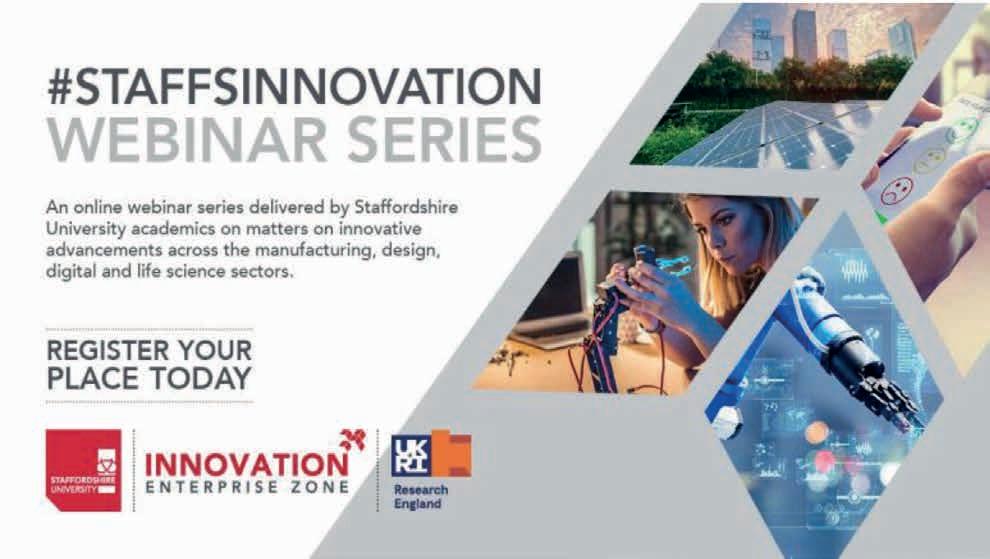
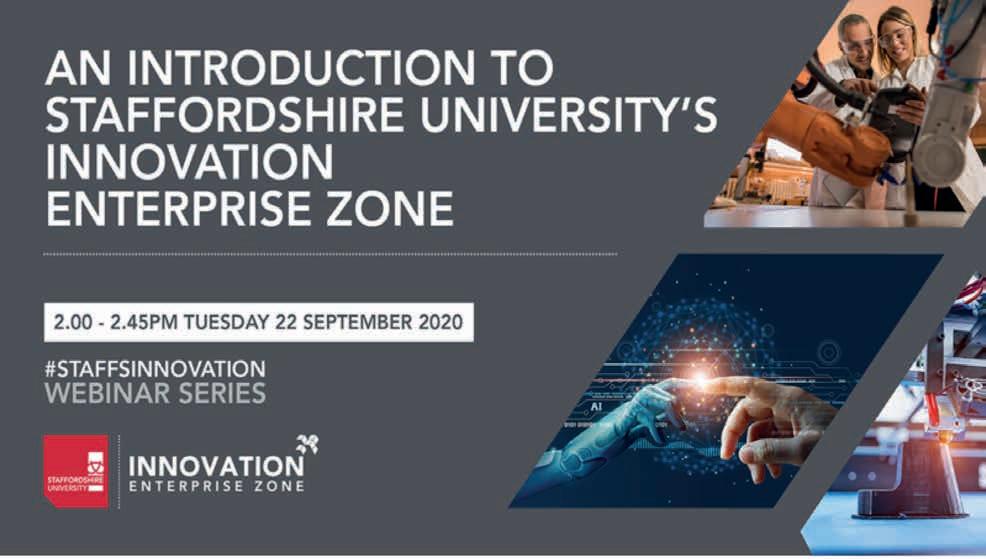
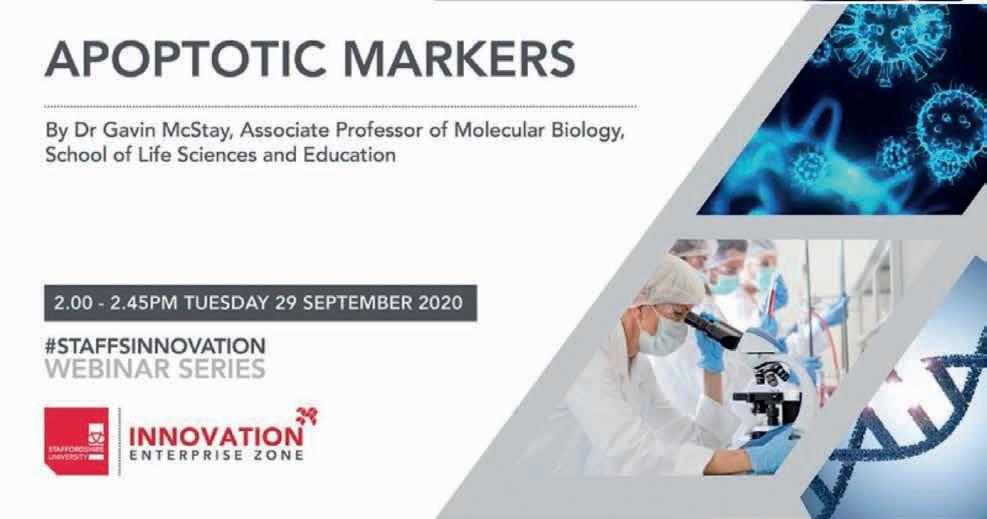
SERIES OF #STAFFSINNOVATION WEBINARS HOSTED SINCE OUR SWITCH TO VIRTUAL DELIVERY
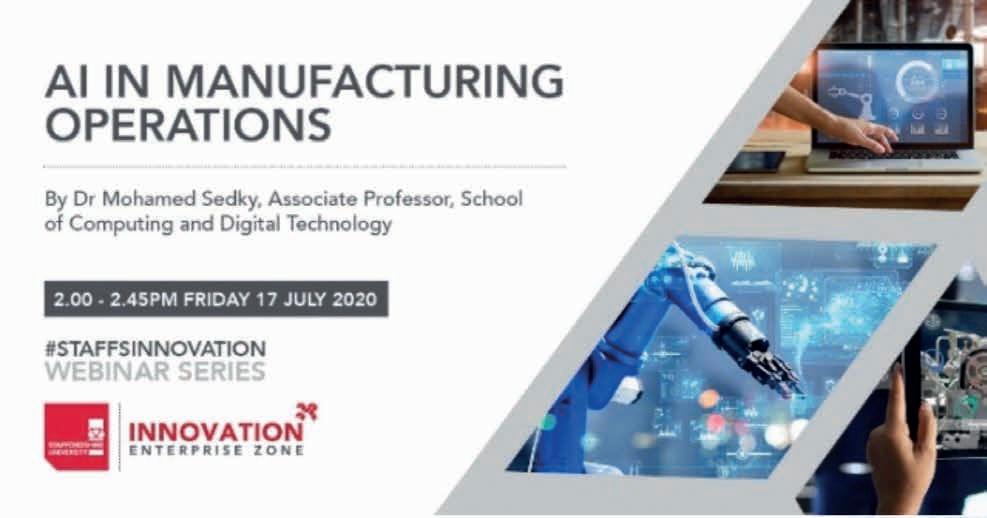

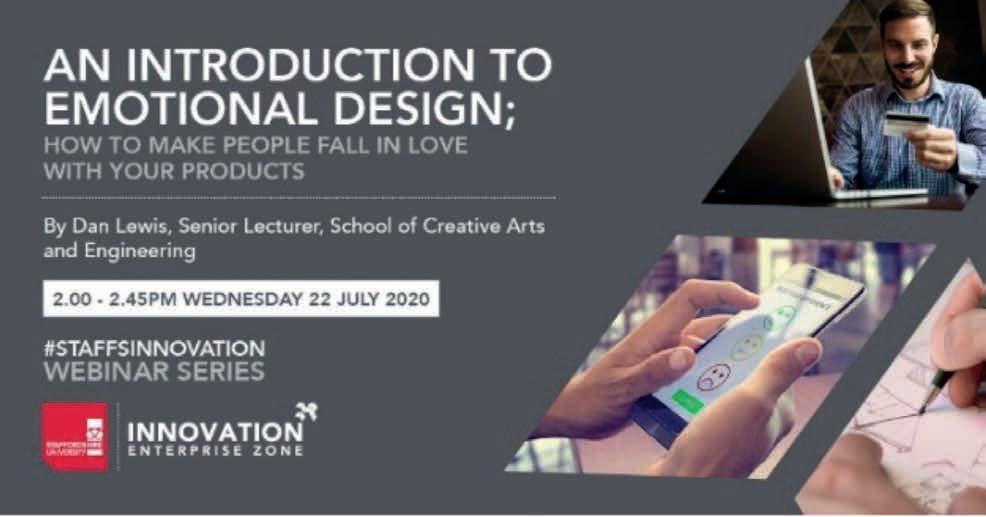
LEADERS OF RESEARCH
Research considered as world leading or of international importance (Research Excellence Framework 2014) wouldn’t be possible without the great minds and inspirational leaders at our institution. Across our different Academic Schools and our Graduate school, we have teams of research specialists who are experts in pushing the boundaries and making a difference to the University, the wider community, and the world.
PROFESSOR FANG ZHAO

Fang Zhao (PhD) is the Professor of Strategy and Innovation and Associate Dean - Research and Enterprise at Staffordshire Business School. Prior to that, she served in the role of Associate Dean at the School of Business and Law of Edith Cowan University, Australia. Staffordshire Business School’s priorities are delivering insight that drives innovation and sustainability and supporting local business communities, especially SMEs to Survive and Thrive during and after the pandemic. Exemplary projects include the future of work, Covid-19 and BAME business, environmental health, and welfare reform. The School will continue to be at the forefront of research in innovation, entrepreneurship and sustainability in business and society.
PROFESSOR TONY DODD
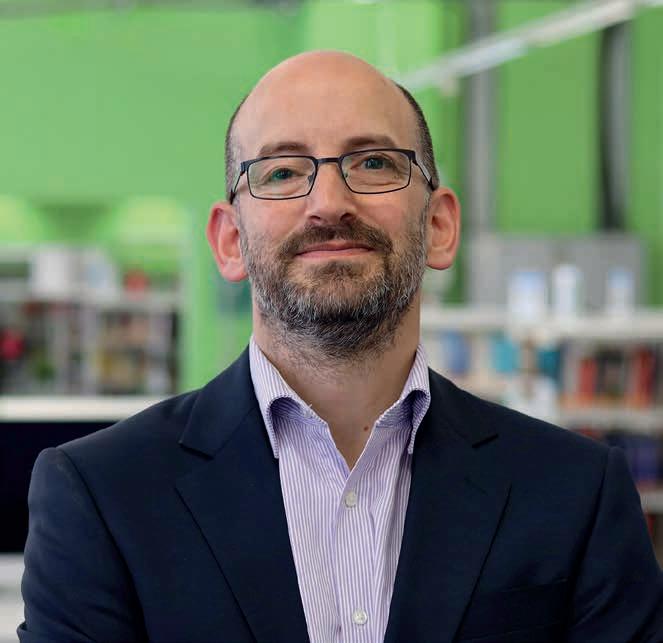
Professor Tony Dodd is the Associate Dean of Research and Enterprise within the School of Digital, Technologies and Arts. His main priority within the University is to develop future leaders in research and enterprise who can make a significant impact in their own fields, to society, the economy, and the environment. During the last 12 months, Professor Dodd’s focus has been on REF, supporting colleagues with grant applications, supporting large enterprise projects, and developing the research culture. Over the next 12 months, Professor Dodd will continue to support high quality research funding applications and to support staff to meet their research and enterprise aspirations.
PROFESSOR BARBARA PIERSCIONEK
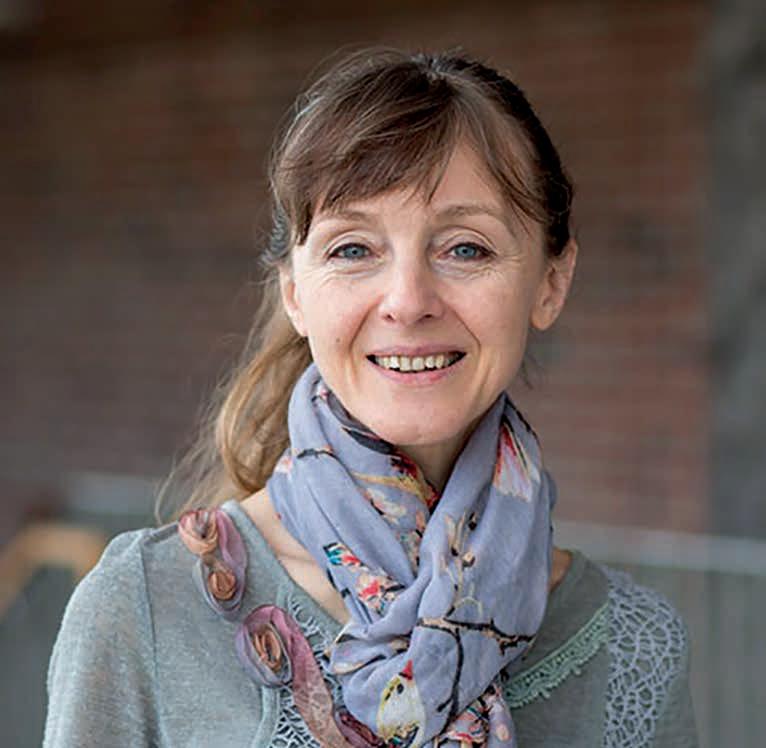
Professor Barbara Pierscionek is the Associate Dean of Research and Enterprise in the School of Life Sciences and Education. She has set strategic aims for Research and Enterprise that are focussed on expansion of interdisciplinary research, growth of external research and enterprise partnerships, a diversification of, and increase in, funding and championing recognition and promotion of research. This has led to an increase in funding submissions and the acquisition of a large EU funded grant. Professor Pierscionek will be leading the development of research and enterprise at the Staffordshire University London and expanding research collaborations with external partners, notably at Alderley Park.
PROFESSOR PETER KEVERN

Professor Peter Kevern is the Associate Dean of Research and Enterprise in the School of Health and Social Care. His work encompasses questions of ageing and religion, with an extended collaboration with a Catholic agency (CSAN) to reframe Catholic thinking about old age and so inform policy in the Catholic Church in England and Wales. This has led to contributions to the thinking of the global Catholic Church via a conference in Rome and, most recently, collaboration with some researchers in Brazil on a project researching the role of Pastoral de Pessoa Idosa, a national movement hosted by the Catholic Church of Brazil supporting isolated older people in the community.
PROFESSOR HUSEYIN SEKER

Professor Huseyin Seker is the Associate Dean for Research and Enterprise in the School of Digital, Technologies and Art. He is an enterprise-focused academic and manager with both academic and industry experiences in data science, artificial intelligence, machine learning, and emerging and disruptive technologies and systems along with their impact-making interdisciplinary applications. He is one of the founding members of the Institute of Coding, one of the UK’s flagship projects and is driving the research and knowledge exchange agenda in the School by creating an interactive and interdisciplinary environment, identifying internal and external opportunities and bringing national and international public and private organisations to collaborate with.







